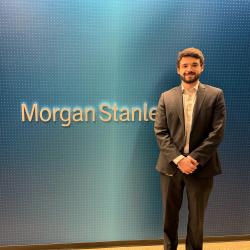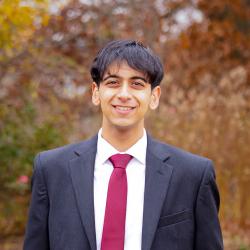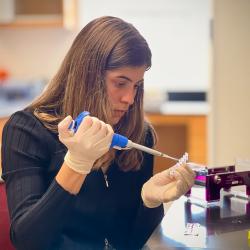Learning Beyond the Classroom
An aspiring research scientist, Katherine Manfred, B.S. ’12, Chemistry and Physics, began searching for hands-on experiences from day one at the college. During her first semester, she joined Chemistry Professor John Fourkas’ lab, which uses ultra-fast lasers to probe and control condensed matter. “I love being in the lab,” says Manfred, who was recently awarded a Clarendon Scholarship to study for three years at Oxford University, where she will pursue a Ph.D. in chemistry. “Every day there’s a new challenge to overcome with the laser set-up, sample preparation or data analysis.”
Manfred, who traveled to the University of Bristol in the United Kingdom to conduct research on the effects of aerosols on climate change during her junior year, is not alone in her quest for experiential learning. Whether it be on- campus research, an internship at a nearby federal laboratory, a study-abroad experience or a service learning project, CMNS students are actively seeking opportunities to enhance their education outside of the traditional classroom.
In 2011, 84 percent of the university’s graduating students in the chemical and life sciences reported they participated in an internship or research project. “Our key location near the nation’s capital is an incredible selling point,” says CMNS Associate Dean Robert Infantino. “One of the reasons students come here is because of our proximity to national and international research institutions, including the National Institute of Standards and Technology, the National Institutes of Health and NASA.”
“It’s never too early for students to start thinking about the value of research, internships and other experiential learning,” says Kaci Thompson, director of CMNS undergraduate research and internship programs, who reinforces that message when she visits each of the sections of the UNIV 100 course that introduces CMNS freshmen to university life. “It’s critical for students to get into a setting where they can participate in the scientific process.”
The college sends daily email alerts to help students identify research and internship opportunities. CMNS also offers an optional one-credit Catalyst Seminar, sponsored by the Howard Hughes Medical Institute, to introduce freshmen and sophomores to the diverse on-campus research opportunities available to them. Faculty looking for research assistants serve as seminar guest lecturers, highlighting their research needs. The seminar also covers topics of importance for student researchers, such as navigating the research process, ethics in science, and critical analysis of research papers and proposals.
Among CMNS students, service learning is also on the rise, says Infantino. In growing numbers students are offering their time and energy to better the community, with pre-med students volunteering at health clinics, environmental science students restoring areas threatened by pollution and physics majors tutoring high school students.
Sean Mbachu
Volunteer, Washington Hospital Center; Kids Enjoy Exercise Now; Researcher, Univ. of Minnesota; Univ. of Southern California
B.S. ’12, Biological Sciences
Career Aspiration
Physician
The Experience
I volunteered for several medical-related organizations and facilities, including the Washington Hospital Center Emergency Room and Kids Enjoy Exercise Now, a nonprofit organization that provides free one- to-one recreational opportunities for children with developmental and physical disabilities. Through a summer research position at the University of Minnesota, I studied the reproductive capacity of the herpes virus, and at USC I pursued a project on the drug resistance of brain tumors. These experiences solidified my desire to pursue a medical career.
Lessons Learned
Research has nurtured my love for science and provided a great opportunity to collaborate with mentors and fellow students. Volunteering has helped me develop a strong sense of compassion for others. Compassion and empathy cannot be taught in the classroom or by reading a book.
Doris Houng
Summer Intern, Microsoft Tellme Mountain View, Calif.
B.S. ’12, Computer Science
Career Aspiration
To work in the fields of human-computer interaction (HCI) and user experience (UX)
The Experience
From the first day, no one spoke to me as “just an intern.” I was asked for my opinions, suggestions and help, and was given lots of freedom to design my project on software development for speech technologies. I’ve accepted a job offer from Microsoft.
Lessons Learned
It was helpful to work alongside people in the industry; you can’t gain that kind of experience in the classroom. I discovered my interest in HCI and UX
Bryan Holder
Undergraduate Teaching Assistant (TA) Department of Astronomy
B.S. ’12 Astronomy and Physics (double major)
Career Aspiration
Astronomy Professor
The Experience
The most enjoyable aspect is the interaction with students through questions and answers. That’s when the real learning takes place.
Lessons Learned
Teaching the introductory astronomy courses has helped me master the basic concepts and given me confidence in public speaking. The first semester I taught, I would get butterflies in my stomach before every discussion session. Now, as a senior, the discussion session is the most relaxing part of the week. This experience will put me ahead of the curve in grad school and help prepare me for becoming a professor.
Emilija Miljkovic Renke
Research Assistant University of Maryland institute for Bioscience and Biotechnology Research
B.S. ’12, Biological Sciences
Career Aspiration
Pharmaceutical-research scientist, specializing in antibiotic resistance
The Experience
Growing up in Serbia in the 1990s during the Balkans conflict was not easy. In this impoverished country, where few medications were available, antibiotics became a cure-all. Witnessing the misuse of these drugs influenced my decision to study science. Due to Serbia’s political instability, I came to study in the United States four years ago. A Howard Hughes Medical Institute Undergraduate Research Fellowship allows me to fight the silent killer: antibiotic resistance.
Lessons Learned
Growing up in Serbia in the 1990s during the Balkans conflict was not easy. In this impoverished country, where few medications were available, antibiotics became a cure-all. Witnessing the misuse of these drugs influenced my decision to study science. Due to Serbia’s political instability, I came to study in the United States four years ago. A Howard Hughes Medical Institute Undergraduate Research Fellowship allows me to fight the silent killer: antibiotic resistance.







